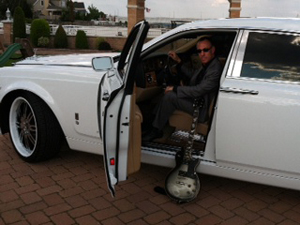The Complete Guitarist: Rut Busters, or How to Break On Through to the Other Side

So you're stuck. You're stuck playing the same old tired Eric Clapton/Chuck Berry blues/pentatonic licks you've played for the past 20 years.
You're stuck listing to the same bands and songs since high school. Your playing and musicianship is stagnant, spinning its wheels in quagmire of the same old same old. I get the picture. We've all been there.
We work hard to reach a new plateau, and once we get there, we lose sight of where the next challenge will be and we end up in a valley. This is a very common occurrence for young musicians and older, more experienced musicians like me.
But fear not! In this blog post, I will offer some different perspectives and solutions on how to break out of that rut to further your musical and personal growth.
Learn How to Read Music: I always thought this was a no-brainer for musicians and guitarists, considering that sight reading was and is such an important part of my musical training. I found out that this is not the case. Learning how to read music will definitely get your fingers and brain moving in ways you're are not accustomed to. Make it a challenge, physically and mentally. If you already read music, I suggest reading a piece from a different genre such as classical or jazz.
Check out the scores from some famous composers such as Mozart and Beethoven. If you choose to do that, don't just follow the main melody; read and transcribe the the oboe part or the viola part to the guitar. You'll hear ideas and melodies you've never heard before. If you really want to break into something new take a piece of music, turn it upside down and then sight read it! Now that's a sure-fire way to break out of a routine.
Strategies for Soloing: Here are a few suggestions to break out of the normal patterns we have been playing for years. Try soloing on every other string. For example, play a solo in E minor pentatonic and only use the first, third and fifth strings to play licks. Then alternate and use only the second, fourth and sixth.
All the latest guitar news, interviews, lessons, reviews, deals and more, direct to your inbox!
Compose a solo using one pitch all over the fretboard, but vary the phrasing, dynamics and rhythm to create something new. Play a solo using only your first and third fingers, then your second and fourth, etc. Get your pinky involved in soloing more. Create licks and phrases utilizing only your third and fourth fingers. Instead of playing scales, play more arpeggios so you can see across the fretboard, not just upwards and downwards.
Experience New Music: I think it's a safe bet to say most guitarists are cut from the same classic-rock cloth: Led Zeppelin, Black Sabbath, The Who, Metallica, Cream, Jimi Hendrix, etc. This music is timeless, life altering, important and mind-blowing. But it's not the be-all-end-all of music. As a matter of fact, I dare say, it is just the small tip of the iceberg. There are styles of music and players we all haven't encountered yet, whether it is African drumming, a modern atonal string quartet or a jazz vocalist who's new to the scene. If you find yourself in a rut musically, seek these new styles out and give a listen. And if you can, experience them live.
One of the greatest gifts I ever received was a subscription to The New York Philharmonic, graciously given to me by the parents of one of my exceptionally talented piano students. I attend about a dozen concerts a year, and every time I walk out of the concert hall I'm inspired to go home and pick up my guitar and play. I am, without fail, blown away by seeing and hearing some of the greatest musicians in the world play some of the most beautiful and incredible music ever written, most of which I've never heard before. You don't have to draw from a musical source for inspiration during a rut, either. Go to a museum or read a great novel. A trip to the Metropolitan Museum of Art on a Sunday afternoon will usually get my creative juices flowing.
Put It Down: There, I said it. Why are we so afraid to not play for a week? Am I advocating becoming a slacker and not practice as much as we should? Absolutely not! But sometimes you have to walk away from it, especially when you have hit a wall with your playing. There are times when I am on vacation that I don't even want to look at a guitar.
When I come back to it, I am usually more fired up than usual, and that's when I usually forge ahead onto the next level and challenge. Body builders often take weeks and sometimes months off to allow their body to heal and grow. I think the same can be said for guitarists and musicians.
If you do this, you must have personal accountability. There's a fine line between putting something down to come back to it stronger and being lazy. Be honest with yourself and listen to that inner-voice throughout this entire process. You know when it's time to get back to it.
Now get off this Internet thing, pick up your guitar and play, just like yesterday — and make a difference. And I mean it!
Guitarist Richard Rossicone is a veteran of the New York City and Long Island original and cover band scene. He's been playing since he was 8, when he attended his first concert (Kiss) and saw Pete Townshend smash a guitar. He has studied with various instructors over the years, which led him to a career in music therapy. He began his educational journey at Queensboro Community College, where the faculty introducing him to classical music. He received his associate's degree in fine arts in 1997 and went on to receive his bachelor's in music therapy in 2001 and his master's in music therapy from New York University in 2004. He's been Board Certified as a music therapist since 2002. Richard continued his studies at C.W. Post University, pursuing a second master's degree in classical guitar performance and music history, studying under Harris Becker. He's been teaching guitar, piano and theory since 2002 and in 2006 started his own company, Rossicone Music Studios. Richard is the co-lead guitarist in Bad Habits, NYC's premier Thin Lizzy tribute band. Visit him at Axgrinder.com
